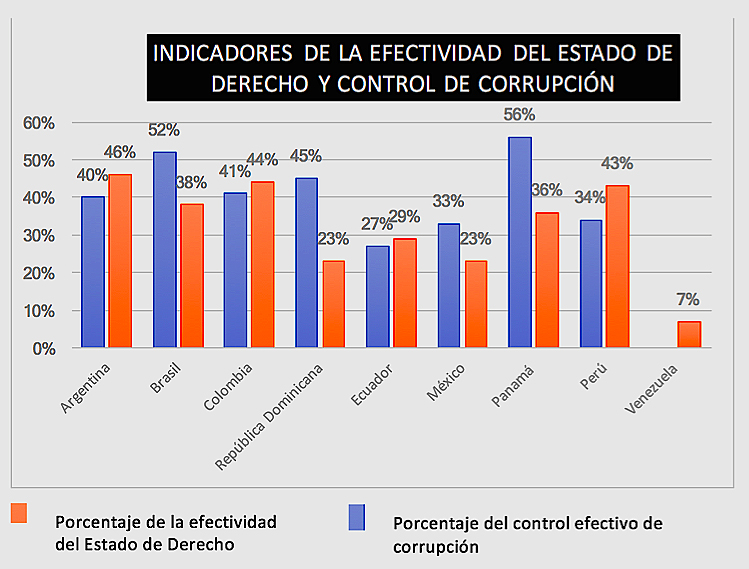Ruta de navegación
Menú de navegación
Blogs
Entries with label corruption .
High levels of corruption and impunity in the region make it difficult to eradicate millionaire bribes in public procurement contracts
The confession of the construction and engineering company Odebrecht, one of the most important in Brazil, of having delivered large sums as bribes to political leaders, parties and public officials for the awarding of works in various countries in the region has been the biggest corruption scandal in the history of Latin America. The B budget increase during the "golden decade" of raw materials occurred in a framework of little improvement in the effectiveness of the rule of law and control of corruption, which led to high levels of illicit deviations in public contracts.

article / Ximena Barría [English version].
Odebrecht is a Brazilian company that conducts business in multiple industries through several operating sites. It is engaged in areas such as engineering, construction, infrastructure and energy, among others. Its headquarters in Brazil are located in the city of Salvador de Bahia. The business operates in 27 countries in Latin America, Africa, Europe and the Middle East. Over the years, the construction company has participated in public works contracts in most Latin American countries.
In 2016, the U.S. Justice department published a research denouncing that the Brazilian company had bribed public officials in twelve countries, ten of them Latin American: Argentina, Brazil, Colombia, Ecuador, Guatemala, Mexico, Panama, Peru, Dominican Republic and Venezuela. The research was developed from the confession made by Odebrecht's own top executives once they were discovered.
The company provided officials in these countries with millions of dollars in exchange for obtaining public works contracts and benefiting from the payment for their execution. The business agreed to submit millions of dollars to political parties, public officials, public candidates or persons related to the Government. Its purpose was to have a competitive advantage that would allow it to retain public business in different countries.
In order to cover up these illicit capital movements, business created fictitious corporations in places such as Belize, the Virgin Islands and Brazil. The business developed a secret financial structure to cover up these payments. The research of the U.S. Justice department established that bribes in the aforementioned countries totaled US$788 million (almost half in Brazil alone). Using this illegal method, contrary to all business and political ethics, Odebrecht obtained the commissioning of more than one hundred projects, the execution of which generated profits of US$ 3,336 million.
Lack of an effective judiciary
This matter, known as the Odebrecht case, has created consternation in Latin American societies. Its citizens consider that in order for acts of this nature subject not to go unpunished, countries must have greater efficiency in the judicial sphere and take more accelerated steps towards a true Rule of Law.
From agreement with World Bank indicators, none of the ten Latin American countries affected by this bribery network reaches 60% of effectiveness of the rule of law and corruption control. This would explain the success of the Brazilian construction company in its bribery policy.
|
source: World Bank, 2016 |
Judicial independence and its effectiveness is essential for the resolution of facts of these characteristics. The proper exercise of justice shapes a proper rule of law, preventing the occurrence of illicit acts or other political decisions that may violate it. Although this is the ideal, the countries involved in the Odebrecht case do not fully comply with this due judicial independence.
Indeed, according to the Global Competitiveness Report for 2017-2018, most of the affected countries obtain a leave grade regarding the independence of their courts, which indicates that they lack an effective judiciary to judge the alleged people involved in this case. This is the case, for example, with Panama and the Dominican Republic, ranked 120th and 127th, respectively, in terms of judicial independence, out of a list of 137 countries.
One of the problems suffered by the Judicial Branch of the Republic of Panama is the high issue of files handled by the Supreme Court of Justice. This congestion makes it difficult for the Supreme Court to work effectively. The high number of processed files doubled between 2013 and 2016: the conference room Criminal Court processed 329 files in 2013; in 2016 there were 857. Although the Panamanian Judicial Branch has improved its budget, that has not represented a qualitative increase in its functions. These difficulties could explain the Court's decision to reject an extension of the research, even though this could mean some impunity. In 2016, there were only two detainees for the Odebrecht case. In 2017, of the 43 defendants who could be involved in the acceptance of bribes valued at US$60 million, only 32 were prosecuted.
The Dominican Republic is also at a similar status . According to a survey of 2016, only 38% of Dominicans trust the judicial institution. This low percentage may have been contributed to by the fact that active members of political parties were elected to serve as Supreme Court judges, something that tarnishes the credibility of the judiciary and its independence. In 2016, Dominican courts only inquired about one person, when the U.S. Supreme Court estimated that the Brazilian business had given $92 million in political bribes, one of the highest amounts outside Brazil. In 2017, the Supreme Court of the Dominican Republic ordered the release from prison of 9 out of 10 allegedly involved in the case due to insufficient evidence.
Need for greater coordination and reform
In October 2017, public prosecutors from Latin America met in Panama City to share information on money laundering, especially in relation to the Odebrecht case. Officials expressed the need to leave no case unpunished, thereby contributing to solving one of the biggest political, economic and judicial problems in the region. Some prosecutors reported having suffered threats in their investigations. All of them valued positively the meeting, as it highlighted the need for greater fiscal coordination and legislative harmony in Latin America. However, it is important to note that the Dominican Republic was absent from meeting.
Any awareness of public ministries in Latin America is essential given the correlation observed between the countries affected by Odebrecht bribes and their poor ranking in indexes provided by different international organizations and centers of research. Ineffective rule of law and lack of control of corruption enable companies like Odebrecht to succeed in their bribery policy to gain a competitive advantage.
The shortcomings of the judicial systems in countries such as Panama and the Dominican Republic, in particular, may make it possible for public officials to go unpunished for crimes committed. In addition, the Odebrecht case, of great magnitude in the region, could further congest judicial activity if effective reforms are not made in each country.

